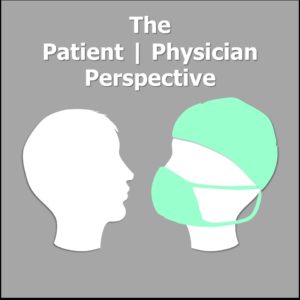I underwent my first transsphenoidal hypophysectomy, fully believing in the capabilities of my neurosurgeon. I hoped that this surgery would cure me of Cushing Disease, a disease which turned my life upside down over the past six months.
Throughout our medical training, we are taught how to fix things and solve problems. Internists develop treatment plans, surgeons perform in the operating room. Generally, physicians hand down instructions that are to be heeded by a handful of other health care professionals involved in the care of the patient. We assure patients that we’re recommending the best options, supported by evidence and data. We entreat them to trust us: “This is what I would suggest if you were my family member.” It’s no wonder that people think physicians have a god complex, and sometimes, rightly so.
My surgeon greeted me in my room when I awoke, telling me that the surgery had gone smoothly. He had removed about a third of my pituitary gland from the left side, as planned, and sent it off to pathology. The next few weeks would be a waiting game — waiting to see whether the surgery had cured me of my disease, waiting to see whether the remainder of my pituitary would still function normally. The surgeon said that he did his best, and he wished me the best. Six weeks post-op, my labs revealed that my pituitary gland had retained functionality, but my Cushing’s remained uncured.
Backed by our research, armed with our sense of duty to patients, I have no doubt that my classmates and I, as well as generations of physicians who have come before and will come after us, have the best of intentions for our patients. We are in medicine because we want to help others; we like to fix problems and people. We want to believe that we have all the answers, or at least, as many of the answers that a human could possibly have.
In the consult room, my neurosurgeon recommended a total hypophysectomy as the next step — a drastic proposal that involved a lifetime of hormone replacements, among other implications. Although he said that imaging had not revealed any tumor, he had already removed the side of my gland that was indicated to be the source of the problem as indicated by intravenous petrosal sampling (a diagnostic radiology technique). After consulting with colleagues in his group, everyone felt there was no other solution and agreed with his proposal.
And so, despite how devastating it was to hear the news of my failed surgery and think about the prospect of continuing to live with my disease, I now say thank you to this neurosurgeon. Ultimately, he had not failed in his ability as a surgeon, but had instead been failed by diagnostic technology, something he had no control over. I believe that he did the best with the information he had, in the operating room and in all the events before and after the surgery.
Ultimately, I sought a second opinion from a different medical institution. After a separate array of MRIs and consultations, a second neurosurgeon, more experienced in this particular field, was able to identify a pituitary tumor via imaging and successfully remove it. At last, I was free of my disease, with about half a year to go through the recovery process before the start of medical school. Today, I feel blessed to have been be Cushing’s-free for the past year and a half and to be able to carry this experience with me as I learn what it is to become a doctor.
To my first neurosurgeon, thank you for teaching me that doctors are fallible because we are human, too. Thank you for instilling in me a sense of humility that I will carry with me throughout my career in knowing that sometimes, our best isn’t enough to cure a patient, but it is enough to know that we have done right by them. As much as we would like to be, doctors are not gods — as hard as we study and as much as we train, we will never have all the answers, and we can never guarantee outcomes. All we have is our best efforts, and the humility to accept that we don’t and can’t control everything.
The Patient | Physician Perspective
Lessons learned from both sides — A column exploring the qualities of a physician from the perspective of a physician in training, through the lens of a patient.

